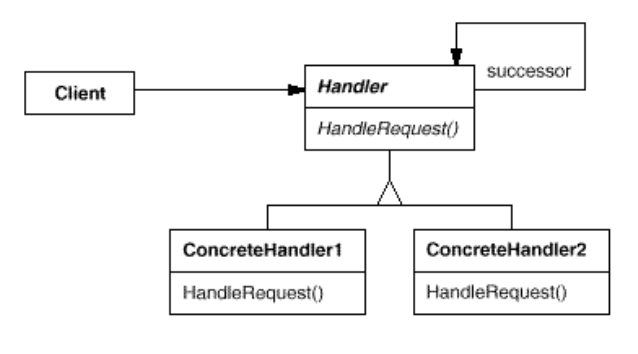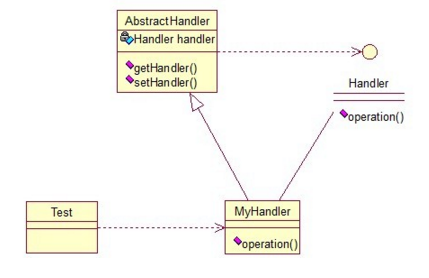13. Chain of Responsibility
- Intent:
- Avoid coupling the sender of a request to its receiver by giving more than one object a chance to handle the request. Chain the receiving objects and pass the request along the chain until an objecthandles it.
- Applicability:
- more than one object may handle a request, and the handler isn’t known a priori. The handler should be ascertained automatically
- you want to issue a request to one of several objects without specifying the receiver explicitly.
- the set of objects that can handle a request should be specified dynamically.
- Structure:


- Participants:
- Handler
- defines an interface for handling requests.
- (optional) implements the successor link.
- ConcreteHandler
- handles requests it is responsible for.
- can access its successor.
- if the ConcreteHandler can handle the request, it does so; otherwise it forwards the request to its successor.
- Client
- initiates the request to a ConcreteHandler object on the chain.
- Handler
- Collaborations
- When a client issues a request, the request propagates along the chain until a ConcreteHandler object takes responsibility for handling it.
- Consequences:
- 1.Reduced coupling.
- 2.Added flexibility in assigning responsibilities to objects.
- 3.Receipt isn’t guaranteed.
- Related Patterns:
- Chain of Responsibility is often applied in conjunction with Composite. There, a component’s parent can act as its successor.
- Code Sample: Chain of Responsibility

public interface Handler {
public void operator();
}
public abstract class AbstractHandler {
private Handler handler;
public Handler getHandler() {
return handler;
}
public void setHandler(Handler handler) {
this.handler = handler;
}
}
public class MyHandler extends AbstractHandler implements Handler {
private String name;
public MyHandler(String name) {
this.name = name;
}
@Override
public void operator() {
System.out.println(name+" test");
if(getHandler()!=null){
getHandler().operator();
}
}
}
public class Test {
public static void main(String[] args) {
MyHandler h1 = new MyHandler("h1");
MyHandler h2 = new MyHandler("h2");
MyHandler h3 = new MyHandler("h3");
h1.setHandler(h2);
h2.setHandler(h3);
h1.operator();
}
}
